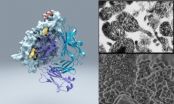(Press-News.org) Viruses mutate fast, which means they can quickly become resistant to anti-viral drugs. But viruses also depend on proteins and nutrients provided by their hosts, and therefore one strategy to identify new anti-viral drugs is to identify and target such host-cell components. A paper published on February 6th in PLOS Pathogens reports that proteins involved in the regulation of cholesterol are essential for hantavirus entry into human host cells.
There are only about 30 known human cases of hantavirus infection in the US per year (with the 2012 cluster in Yosemite National Park a recent example), but hanta is among the most deadly known human viruses: between 30 and 40% of people who are diagnosed die from hantavirus pulmonary fever. People who have hantavirus are not contagious, transmission only occurs when humans breath in small particles that carry excrements from infected rodents.
Together with colleagues, Paul Bates and Kenneth Briley, from the University of Pennsylvania, USA, set out to identify factors and pathways in human cells that were important for hantavirus infection. They focused on a member of the hantavirus group called Andes virus (ANDV). For their experiments they used mostly less dangerous viruses that were genetically engineered to share some characteristics with ANDV, and then used ANDV itself to confirm that the results were true for hantavirus as well.
In two independent genetic screens (systematic searches), they identified four proteins that were involved in hantavirus infection, and all of them were part of a protein complex that regulates cholesterol production in mammalian cells. The scientists next tested whether an experimental drug that targets one of the four proteins could prevent viral entry. They found that treating cells that originated from human airways with this drug before exposing them to virus resembling hanta made the cells less susceptible to virus infection.
Since one of the effects of this experimental drug is that it lowers cholesterol levels in cells, the researchers asked whether statins, a well-known group of cholesterol-lowering drugs that are taken daily by millions of people around the world, could also protect against hantavirus infection. Indeed, pre-treatment of human cells with mevastatin (a member of the statin group that lowers cholesterol by mechanisms that do not involve the proteins they had identified in their screen) made them less susceptible to ANDV infection.
The researchers say "The sensitivity of ANDV to safe, effective cholesterol-lowering drugs may suggest new treatments for ANDV infection and pathogenesis." Moreover, as cellular cholesterol balance has been found to be important for a number of other viruses as well, they hope that "targeting this process might lead to the development of broadly effective anti-virals".
INFORMATION:
Funding: This work was supported by grants from the National Institutes of Health R01AI081913 (PB), R01AI074951 (SC) U54AI057168 (RWD & SC) and R01AI095500 (SC). Trainees were supported by NIH awards T32AI055400 (JP and KB), T32AI007324 (EAB), T32GM007229 (MJD), and T32AI07632 (CBW). This work was also supported by R01 AI052845 (to FDB) and F32 AI106333 (to KB). SC is a recipient of the Burroughs Wellcome Investigators in the Pathogenesis of Infectious Disease Award. The funders had no role in study design, data collection and analysis, decision to publish, or preparation of the manuscript.
Competing Interests: The authors have declared that no competing interests exist.
Citation: Petersen J, Drake MJ, Bruce EA, Riblett AM, Didigu CA, et al. (2014) The Major Cellular Sterol Regulatory Pathway Is Required for Andes Virus Infection. PLoS Pathog 10(2): e1003911. doi:10.1371/journal.ppat.1003911
Cholesterol plays a critical role in hantavirus infection
2014-02-06
ELSE PRESS RELEASES FROM THIS DATE:
Toxin in seafood causes kidney damage in mice at levels considered safe for consumption
2014-02-06
Washington, DC (February 6, 2014) — A chemical that can accumulate in seafood and is known to cause brain damage is also toxic to the kidneys, but at much lower concentrations. The findings, which come from a study appearing in an upcoming issue of the Journal of the American Society of Nephrology (JASN), suggest that officials may need to reconsider what levels of the toxin are safe for human consumption.
The world's oceans contain algae that produce certain chemicals that can be harmful to humans and other living creatures. Many of these chemicals are considered neurotoxins ...
Acute kidney injury may be a risk factor for later heart problems
2014-02-06
Washington, DC (February 6, 2014) — Patients who experience abrupt kidney injury following surgery have an increased risk of later developing heart problems, according to a study appearing in an upcoming issue of the Journal of the American Society of Nephrology (JASN). The findings suggest that properly treating and monitoring patients with acute kidney injury (AKI) could help protect their heart health.
AKI, an sudden decline in kidney function, is an increasingly prevalent and potentially serious condition in hospitalized patients. Sometimes acute kidney injury arises ...
Reduce the chloride to restore the switch
2014-02-06
This news release is available in French. A drug given to pregnant mice with models of autism prevents autistic behavior in their offspring, a new report shows, and though the drug could not be administered prenatally in humans (there is no way to screen for autism in human fetuses), clinical trials of this drug administered later in development, in young children who have already developed autistic symptoms, are showing progress.
The causes of autism spectrum disorder, or ASD, are complex and not well understood.
Prolonged excitation of brain neurons seems partly ...
The ultimate decoy: Scientists find protein that helps bacteria misdirect immune system
2014-02-06
LA JOLLA, CA—February 6, 2014—A team led by scientists at The Scripps Research Institute (TSRI) has discovered an unusual bacterial protein that attaches to virtually any antibody and prevents it from binding to its target. Protein M, as it is called, probably helps some bacteria evade the immune response and establish long-term infections.
If follow-up studies confirm Protein M's ability to defeat the antibody response, it is likely to become a target of new antibacterial therapies. The protein's unique ability to bind generally to antibodies also should make it a valuable ...
Decoding dengue and West Nile: Researchers take steps toward control of health proble
2014-02-06
ANN ARBOR—Dengue fever and West Nile fever are mosquito-borne diseases that affect hundreds of millions of people worldwide each year, but there is no vaccine against either of the related viruses.
A team of scientists at the University of Michigan and Purdue University has discovered a key aspect both to how the viruses replicate in the cells of their host and how they manipulate the immune system as they spread.
In a study scheduled for online publication Feb. 6 in the journal Science, researchers led by Janet Smith of the U-M Life Sciences Institute describe for ...
Autism: Birth hormone may control the expression of the syndrome in animals
2014-02-06
This news release is available in French.
The scientific community agrees that autism has its origins in early life—foetal and/or postnatal. The team led by Yehezkel Ben-Ari, Inserm Emeritus Research Director at the Mediterranean Institute of Neurobiology (INMED), has made a breakthrough in the understanding of the disorder. In an article published in Science, the researchers demonstrate that chloride levels are elevated in the neurons of mice used in an animal model of autism, and remain at abnormal levels from birth. These results corroborate the success obtained ...
Opening 'the X-files' helped researchers to understand why women and men differ in height
2014-02-06
Researchers from the University of Helsinki analyzed thoroughly the commonly occurring genetic variation in chromosome X, one of the two sex-determining chromosomes, in almost 25,000 Northern European individuals with diverse health-related information available. The aim of the study was to find genetic factors that could explain individual differences in several traits, including BMI, height, blood pressure and lipid levels. In addition, the researchers also investigated whether the X chromosome would contribute to some of the well-known differences between men and women ...
Theorists predict new forms of exotic insulating materials
2014-02-06
CAMBRIDGE, Mass-- Topological insulators — materials whose surfaces can freely conduct electrons even though their interiors are electrical insulators — have been of great interest to physicists in recent years because of unusual properties that may provide insights into quantum physics. But most analysis of such materials has had to rely on highly simplified models.
Now, a team of researchers at MIT has performed a more detailed analysis that hints at the existence of six new kinds of topological insulators. The work also predicts the materials' physical properties in ...
Researchers pinpoint protein associated with canine hereditary ataxia
2014-02-06
Researchers from North Carolina State University have found a link between a mutation in a gene called RAB 24 and an inherited neurodegenerative disease in Old English sheepdogs and Gordon setters. The findings may help further understanding of neurodegenerative diseases and identify new treatments for both canine and human sufferers.
Hereditary ataxias are an important group of inherited neurodegenerative diseases in people. This group of diseases is the third most common neurodegenerative movement disorder after Parkinson's and Huntington's diseases.
In people with ...
Nutritional supplement improves cognitive performance in older adults, study finds
2014-02-06
Tampa, FL (Feb. 6, 2014) – Declines in the underlying brain skills needed to think, remember and learn are normal in aging. In fact, this cognitive decline is a fact of life for most older Americans.
Therapies to improve the cognitive health of older adults are critically important for lessening declines in mental performance as people age. While physical activity and cognitive training are among the efforts aimed at preventing or delaying cognitive decline, dietary modifications and supplements have recently generated considerable interest.
Now a University of South ...



